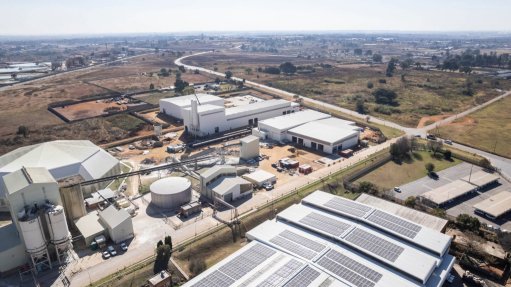Diverse approach needed to solve energy crisis
As a vast continent, with 54 countries and more than 1 000 languages, Africa’s approach to electrification and industrialisation should be both intricate and collaborative, says Frost & Sullivan Africa partner and CEO Hendrik Malan.
“It’s about short-, medium- and longer-term requirements. People need to consider a longer-term approach, but also take into account that, in the shorter term, there are certain financial realities that we must examine. Renewable energy is expensive, and Africa needs to industrialise,” he tells Engineering News, speaking ahead of Enlit Africa’s conference, which will be hosted at the Cape Town International Convention Centre from May 16 to 18.
Malan says mitigating measures can be put in place to ensure that the continent’s carbon footprint does not equal that of the developed countries in the energy sector.
“We can use transition fuels and feedstock. There are many things that we can do to contain our overall emissions, from an economic perspective, and still industrialise and get access to the required levels of energy.”
Finding Opportunities in New Technology
Frost & Sullivan, which provides insights into the green economy, notes that the current biggest global trend is the transition to electric vehicles (EVs), and Malan believes there could be opportunities for Africa, including battery production.
The continent tends to think in extremes, focusing either purely on extractive industries or prioritising the complete beneficiation of, for example, the inputs required for the entire battery or EV. There is a paucity of appreciation of the complexities and subtleties associated with these industries, he avers.
“For Africa to move from where we are, which is pretty much purely focused on the extractive aspect of the EV value chain, to the battery production component, is a big leap.”
Malan is convinced that a more realistic approach would be to start by beneficiating the minerals that are extracted, which would move African countries two or three steps further along the value chain.
“You generate significantly more value for the continent just off the back of those two, three steps, but it’s not that ‘sexy’, from a political perspective, which is probably one of the reasons why we haven’t progressed that much,” he declares.
Capital at Scale, Capital at Speed
Malan is one of the keynote speakers at the Enlit Africa conference.
He will participate in a panel that explores capital projects within the energy industry. This will include Africa 2063 – Africa’s development blueprint to achieve inclusive and sustainable socioeconomic development.
“There are some fundamental issues that need to be addressed to attract more funding to the industry. If there’s something that we need to be focusing on over the next five years, it’s really to attract capital,” declares Malan.
He refers to “capital at scale and capital at speed” when talking about attracting funding to Africa. This speaks to a “dramatic” level of capital coming into the continent, at speed, to address, among other aspects, infrastructure legacy issues, to ensure that challenges pertaining to energy and environmental issues are addressed.
“But there are some fundamental issues around things like governance that must also be addressed,” warns Malan adding,
private captial has a reluctance to commit investment at scale because of their fear of how governance structures will handle large and systematic capital injections.
Partnering on Renewables
Malan says that one of the biggest challenges is that the continent needs a combined investment approach to renewables on the one side and some kind of baseoad power on the other.
Distributed resources, distributed power, microgrids and renewable energy must be expedited, but Malan insists that they be complemented by baseload energy.
“We must find innovative ways of funding larger-scale baseload projects in Africa to balance our grids and fuel development. Accessing international finance is becoming nearly impossible, so we must start generating our own sources of finance,” he concludes.
Article Enquiry
Email Article
Save Article
Feedback
To advertise email advertising@creamermedia.co.za or click here
Comments
Press Office
Announcements
What's On
Subscribe to improve your user experience...
Option 1 (equivalent of R125 a month):
Receive a weekly copy of Creamer Media's Engineering News & Mining Weekly magazine
(print copy for those in South Africa and e-magazine for those outside of South Africa)
Receive daily email newsletters
Access to full search results
Access archive of magazine back copies
Access to Projects in Progress
Access to ONE Research Report of your choice in PDF format
Option 2 (equivalent of R375 a month):
All benefits from Option 1
PLUS
Access to Creamer Media's Research Channel Africa for ALL Research Reports, in PDF format, on various industrial and mining sectors
including Electricity; Water; Energy Transition; Hydrogen; Roads, Rail and Ports; Coal; Gold; Platinum; Battery Metals; etc.
Already a subscriber?
Forgotten your password?
Receive weekly copy of Creamer Media's Engineering News & Mining Weekly magazine (print copy for those in South Africa and e-magazine for those outside of South Africa)
➕
Recieve daily email newsletters
➕
Access to full search results
➕
Access archive of magazine back copies
➕
Access to Projects in Progress
➕
Access to ONE Research Report of your choice in PDF format
RESEARCH CHANNEL AFRICA
R4500 (equivalent of R375 a month)
SUBSCRIBEAll benefits from Option 1
➕
Access to Creamer Media's Research Channel Africa for ALL Research Reports on various industrial and mining sectors, in PDF format, including on:
Electricity
➕
Water
➕
Energy Transition
➕
Hydrogen
➕
Roads, Rail and Ports
➕
Coal
➕
Gold
➕
Platinum
➕
Battery Metals
➕
etc.
Receive all benefits from Option 1 or Option 2 delivered to numerous people at your company
➕
Multiple User names and Passwords for simultaneous log-ins
➕
Intranet integration access to all in your organisation
















